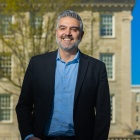
Erkin Özay
AIA, MArch
A passion for teaching and community-building
In his teaching, Özay draws inspiration from the activist inclinations of his students: “There is an infectious sense of urgency to the work we do at the school, shared by the students and faculty alike. There are also shared priorities articulated around the centrality of social and environmental justice. This sense of urgency keeps me on my toes to expand my horizons."
"I am energized and motivated by the curiosity and passion of our students. I often engage in a process of co-learning with my students in each course I have the privilege of teaching.”
Özay's intensive engagement with the urban landscapes and people of Buffalo has had a similarly profound impact on his work.
"Compared to other institutions I have taught in, the walls of our School are much thinner, and there is a broad audience to what we do. Our students greatly benefit from this two-way interaction, especially through engagements that reveal how they can amplify their agency by becoming part of equity-oriented coalitions."
"Buffalo is paradigmatic in the way it was impacted and scarred by the disenfranchising social and economic forces of the 20th century," he continues. "At the same time, the city's marginalized communities devised uniquely potent ways to mediate some of these pressures. The urban landscape is replete with lessons on how these groups endured and mediated these pressures."
According to Özay, such socioeconomic dynamics are reshaping the profession of architecture. "In the last twenty years, there is a growing realization in the discipline about the degree to which architecture has been co-opted by market-driven development paradigms, generating an impetus to search for new models of practice and venues to expand architecture's agency on challenges long ignored by the discipline: racial and social justice, climate change, equitable modes of development."
Özay says there are hopeful trends in the industry, including movement toward circular material systems, middle-scale energy generation, and robotic assembly systems. Meanwhile, the disenfranchising impacts of mass surveillance, ongoing financialization of housing, and inability to build consensus and take large-scale action on the climate crisis will continue to plague our urban environments.
Özay says there are hopeful trends in the industry, including movement toward circular material systems, middle-scale energy generation, and robotic assembly systems. Meanwhile, the disenfranchising impacts of mass surveillance, ongoing financialization of housing, and inability to build consensus and take large-scale action on the climate crisis will continue to plague our urban environments.
Research spotlight
Urban renewal and school-led redevelopment
Özay's recent book, Urban Renewal, and School Reform in Baltimore: Rethinking the 21st Century Public School (Routledge, 2021), builds on his research interests in urban asset distribution practices and their spatial impacts on the city. The book contributes to an expanded agenda for understanding the implications of school-led redevelopment and school reform.
Based on five years of research and fieldwork, the book provides important insights on a complex and poorly documented urban renewal endeavor in East Baltimore. As such, Özay relied heavily upon archival research and interviews with key project actors, seeking to elevate the voices of community members who were undermined by the official accounts of the development effort. The framing provides a new context on the problematic conditions of the renewal initiative and its disenfranchising decision-making mechanisms, as well as the resulting mass displacement.
Referring to the foundational work by community activists and citizen researchers who played a crucial role in curbing the aggressive conditions of the renewal effort, Özay says: "My work is all but a modest contribution compared to theirs, in an effort to contextualize the important lessons to learn from this project."